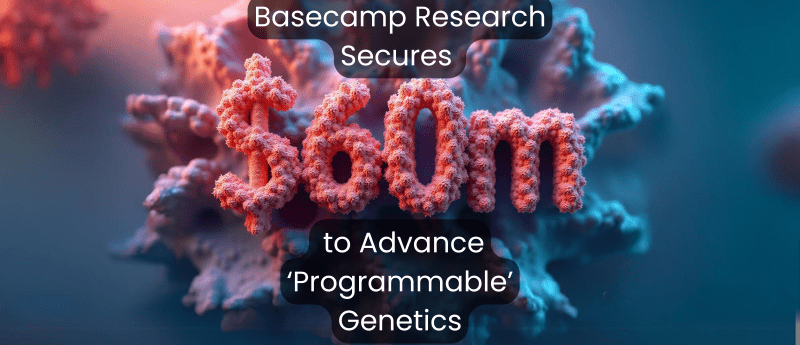AI Startup Basecamp Research Secures $60M to Advance ‘Programmable’ Genetics

With its Series B funding round, emerging AI company Basecamp Research has raised $60 million to develop new types of fusion proteins, bringing the field one step closer to achieving “programmable” genetic medicines.
The startup, focused on advancing the frontiers of biology through AI, has entered into a multiyear collaboration with Harvard University (HU) and the Broad Institute of the Massachusetts Institute of Technology (MIT).
Basecamp: Transformative Potential for Pharmaceutical Innovations
Before this new partnership, Basecamp’s work had already led to significant advancements in the development of AI models designed to identify novel protein molecules.
This includes the development of the end-to-end protein LLM ZymCTRL, created in partnership with Ferruz Laboratory at the Institute of Molecular Biology of Barcelona. ZymCTRL is capable of successfully designing enzymes for more sustainable industrial practices.
Additionally, Basecamp was also involved in the release of the deep learning model BaseFold, which focuses on predicting the composition of large and complex protein structures. BaseFold was developed to become an augmented version of the industry benchmark AlphaFold 2, and creators said it delivered up to six times more accurate results and up to a threefold improvement in small molecule docking.
This year, AlphaFold 2 served as a milestone for the development of AlphaFold 3, which can now predict interactions involving biological molecules such as DNA and RNA.
Despite AlphaFold 3’s advanced capabilities, BaseFold continues to offer valuable insights into applied biotechnology or therapeutic research focused on unique or biodiverse protein interactions. Leveraging vast biological datasets, BaseFold specializes in predicting the 3D structures of large proteins, which is crucial for drug discovery and development.
Moreover, Basecamp is currently building a database of natural biological interactions created to design complete biological systems and enhance the training of artificial intelligence models.
Basecamp affirms that its database is “the world’s largest”, holding 100 times more advanced information on biological systems than public databases.
Basecamp believes that its dataset is more comprehensive than that of other AI drug discovery firms, which often rely primarily on scientific experiments to train AI models, limiting the technology’s learning capabilities.
By harnessing its larger dataset, the company aims to overcome the previous challenges of speed and complexity in biological design, potentially streamlining the drug discovery process.
“We are pushing past AI’s limits in biological design by doubling down on solving the fundamental data gap that the entire biotech industry faces. Basecamp Research is using its technology to generate new and deeper insights, going beyond known biology and each day expand what we can offer to our partners in the biopharma ecosystem.”
Dr. Glen Gowers, co-founder and chief executive of Basecamp Research.
A Promising Partnership
Basecamps’s Series B funding round was led by Paris-based venture firm Singular, with collaboration from other technology and life sciences investors including S32, vice chairman of Roche André Hoffmann and former Unilever CEO Paul Polman.
“Basecamp has dedicated itself to solving some of the toughest challenges in the life sciences and is taking a truly first principles approach to address questions that the biopharma industry hasn’t even known to ask”.
Andy Conrad, general partner at S32 and founder of Alphabet’s Verily Life Sciences.
As part of this new association, Basecamp is working alongside core member at Broad Institute Dr. David Liu to assist biological systems in taking a step forward towards “programmable genetic medicines.”
Basecamp has been gathering data to better understand the conflictive relationship between bacteria and viruses. According to Gowers, this data could become a game-changer in the current understanding of gene editing. Although no further details have been provided, Liu’s Lab will make use of the information compiled.
The partnership aims to uncover new techniques for identifying fusion proteins—complex molecules formed by combining two or more gene-encoded domains, allowing them to be transcribed and translated as a single unit—and other large biomolecules.
The strategy may also include initiatives such as adjusting the dosages within biological networks, modifying functional mechanisms, or designing molecules using specific protein-encoding genes.
By doing so, Basecamp aims to design new care plans for various health conditions, paving the way for novel, cutting-edge medications.
What to Expect
Basecamp Research plans to use the newly secured funding to continue expanding its current database and develop a new generation of protein-focused AI models.
The company’s objective is to engage with a broader range of biopharma companies and contribute to the further development of medical pharmacology.
As Basecamp’s case suggests, AI has shown significant potential as a groundbreaking tool for advancing recent developments in pharmaceutical research and protein stability prediction, with remarkable potential to make drug discovery more effective.
However, the implementation of AI in modern medical procedures faces significant challenges that affect its reliability. AI-powered devices are often associated with concerns around clinical validation and patient data security, while the lack of clear regulations in clinical applications contributes to uncertainty.
To overcome these obstacles, future efforts must focus on addressing these key issues, ensuring both patient safety and trust in the use of AI in healthcare.